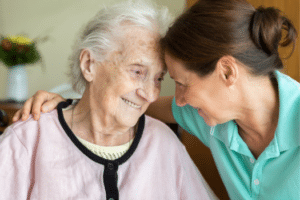They may not have fancy degrees and work in offices. Their personal hygiene habits may be questionable. Heck, they don’t even wear clothes! But sometimes, pets can be the best form of senior therapy available. Read on to find out why.
They’re good socializers
Many older adults who are homebound feel isolated. Without jobs to go to every day, community activities to engage in, or the ability to travel to family and friends, older adults can get lonely – fast. If they don’t have a home health aide to visit them, an adult day club to attend, or a lifeline by phone, the lack of socializing can cause a decline in their physical and mental well-being. However, pets who are brought up to enjoy human company live to socialize! They’re great listeners, cheer people up with their antics, and often form deep and meaningful bonds with their owners.
They provide unconditional love
While there are many benefits to the aging process, most older adults agree that there is a certain amount of decline in physical functioning. Animals never take this into consideration when spending time with their favorite people. All they want are loving hands, a friendly voice, and a soft lap. A good pet truly embodies the textbook definition of unconditional love.
They offer health benefits
By now, you may be aware that being around animals can help lower blood pressure, decrease stress, increase energy, and aid in other physiological improvements. Even walking a dog with their home health aide can help an older adult get fresh air and exercise. However, there are cognitive benefits as well, such as prompting memory when your loved one puts their pet on a feeding schedule. And, unlike having to pay a visit to a professional (not to mention arranging transport to get there), your loved one can enjoy pet companionship at any time!
They can be looked after in many ways
Many homebound older adults have no trouble performing small caregiving tasks for their pets (such as brushing a cat or feeding the fish). However, for some, physical limitations may make pet maintenance all but impossible. A person with balance issues may not be able to bend over to scoop up cat litter, and walking a dog will prove difficult for someone with general weakness.
However, the pet’s owner doesn’t necessarily have to be the one taking care of them. A home health aide can easily come in as needed and perform caretaking tasks for pets, such as working the can opener when it’s feeding time, or taking them on walks. If your loved one has always wanted a pet but is concerned about the upkeep, a few hours of help at home can open up a whole new world to them!
Human senior therapy: when a furry friend is not enough
It’s true that pets offer a unique and possibly life-changing type of senior therapy. However, this doesn’t mean you should neglect traditional means of therapy – especially if you suspect that your loved one has a serious condition like depression. In these cases, it’s usually best to consult a (human) professional to see if other interventions are needed. Often, your visiting health agency can arrange a home session with the right clinician, or have an aide transport your loved one to their office.
We probably don’t need to say this, but we’ll say it anyway: pets are not licensed therapists! Therefore, they should not considered the first line of defense against a serious mental illness or mood disorder. However, you can still talk to you loved one’s physician to see if pets can be used to increase their coping skills. These days, many doctors are familiar with the benefits of older adults having pets and are happy to see them get such support.
If you are unsure of how to best help an aging loved one, the trained and compassionate staff at the Institute on Aging is here to help you make that decision and gain the best in at-home care for older adults. Contact us to find out more.







